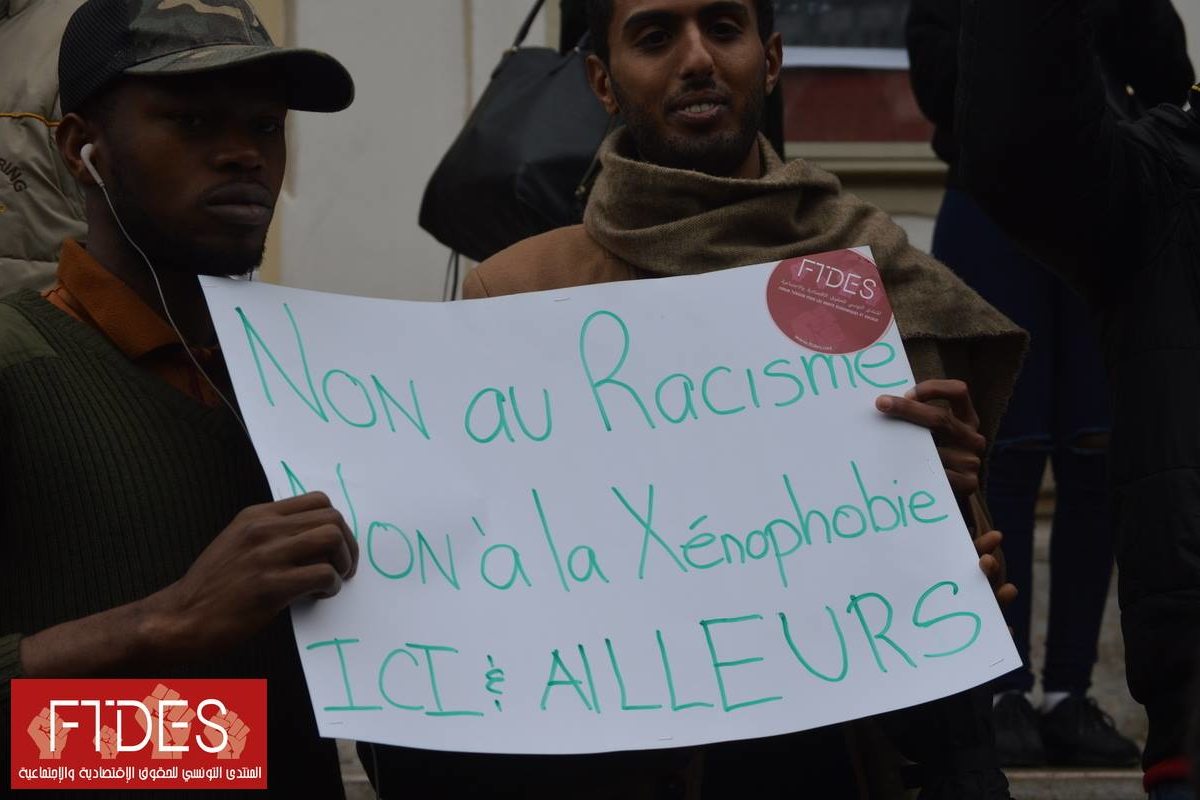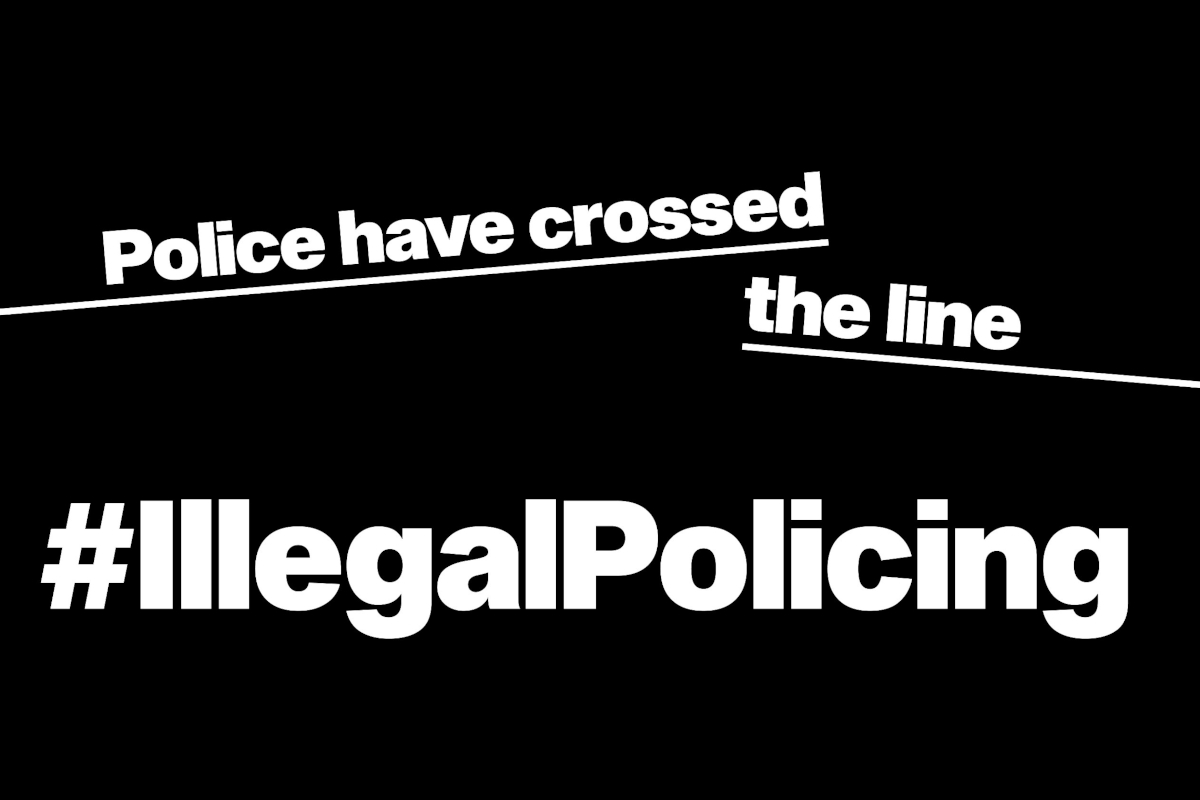Arbitrary arrests and hate campaigns against sub-Saharan migrants in Tunisia
Topic
Country/Region
22 February 2023
Press release originally published by the Forum Tunisien des Droits Economiques et Sociaux (FTDES) on 16 February.
Support our work: become a Friend of Statewatch from as little as £1/€1 per month.

Image: FTDES
The original press release (in French) is available here. It was published days before another speech by the Tunisian president in which he appeared to take up the "Great Replacement" conspiracy theory, saying: "The undeclared goal of the successive waves of illegal immigration is to consider Tunisia a purely African country that has no affiliation to the Arab and Islamic nations."
"Africa for Africans" is what President Kais Saied said during his speech at the Europe-Africa summit in Brussels on February 17, 2022. However, the latest events in Tunisia go against the declaration of President Kais Saied, in view of the campaign launched by the security apparatus entitled "Reinforcement of the security fabric and reduction of the phenomenon of illegal residence in Tunisia", which has resulted in recent days in waves of massive arrests.
In recent days, more than 300 migrants have been arrested, taken into custody and brought to justice. They were arrested following a "face control" identity check or even following their presence in court in support of their relatives.
At the same time, the Tunisian State is turning a deaf ear to the rise of hateful and racist discourse on social networks and in certain media, which specifically targets migrants from sub-Saharan Africa; this hateful and racist speech is even carried by certain political parties, which carry out propaganda actions on the ground facilitated by the regional authorities.
Today, according to the latest study by the National Institute of Statistics, dating from 2021, the number of migrants from sub-Saharan Africa in Tunisia would be 21,466, including students. These figures belie the discriminatory racist discourse based on the amplification and security approach to the treatment of migration issues in Tunisia.
Human rights violations are reported daily, ranging from inhuman and degrading treatment, arbitrary detention at borders at gunpoint, confiscation of phones, denial of access to medical care. The issue of the administrative status of sub-Saharan migrants presents a humanitarian challenge that requires a response that respects rights and includes marginalized people, rather than repressive security approaches.
In this sense, the actions of the Tunisian authorities run counter to their obligations under the 1951 Geneva Convention on Refugees, which Tunisia ratified in 1957, as well as the African Charter on Human Rights. and peoples.
European border externalization policies have for years contributed to transforming Tunisia into a key player in monitoring migration routes in the Mediterranean, including the interception of migrant boats outside territorial waters and their transfer to Tunisia. Discriminatory and restrictive policies in Algeria also contribute to pushing migrants to flee to Tunisia. These policies deepen the human tragedy of migrants in a Tunisia in political and socio-economic crisis.
Signatory organizations and associations:
- Strongly condemn the arbitrary arrests targeting migrants from sub-Saharan Africa.
- Denounce the human rights violations suffered by migrants from sub-Saharan Africa and call on the Tunisian authorities to fight against hate speech, discrimination and racism against them, as well as to intervene in the event of an emergency to guarantee the dignity and rights of migrants.
- Call on the Tunisian government to respect its commitments to the implementation of international agreements on the rights of migrant workers. and refugees, as well as the recommendations of the Universal Periodic Review and the Committee on Migrant Workers.
- Express their deep concern about the marginalization of the most vulnerable groups, in particular migrants in Tunisia, who already suffer from social exclusion and live in poverty, deprived of access to decent and formal work, from any source of income, of an administrative situation aggravates their suffering and obliges them, as well as their families, to face challenges which can only be overcome by the courageous intervention of the government to help them.
- Demand the protection and guarantee of the rights of migrants and respect for their dignity, and the Tunisian authorities must put an end to the exploitation they face at work. Taking these steps will also benefit the Tunisian labor market, where migrants represent an innovative force capable of boosting the national economy if they are treated with fair and human rights-respecting employment laws and policies.
- Renew the call on the Tunisian government to assume this historic responsibility and to make every effort to implement a framework for the regularization of migrants present on Tunisian territory, responding to the various calls from civil society and eliminating the fears of national and associations that have expressed them for years concerning the exploitation and vulnerability of non-regular workers in Tunisia.
- Emphasize the need to update and develop a legal framework relating to immigration and asylum to bring it into line with international standards, as well as to give priority to the launch of a national immigration strategy that guarantees the integration and protection of rights.
Signatory organisations:
Forum tunisien des droits économiques et sociaux (FTDES)
Ligue tunisienne des droits de l'homme (LTDH)
Association tunisienne des femmes démocrates (ATFD)
Avocat sans frontières (ASF)
Association convergence pour les droits et les libertés (ACDL)
Association pour le droit à la différence (ADD)
Association tunisienne de défense des droits individuels (ADLI)
Association Nachaz Dissonances
Association tunisienne pour la justice et l' égalité - Damej
Association pour le leadership et le développement en Afrique (ALDA)
Plateforme tunisienne des alternatives
Organisation tunisenne contre la torture (OCTT)
Comité pour le respect des libertés et des droits de l'homme en Tunisie (CRLDHT)
Fédération des tunisiens citoyens des deux rives (FTCR)
Association tunisienne pour l'action culturelle
Voix de femmes
Association Calam
Association tunisienne de soutien aux minorités (ATSM)
Organisation mondiale contre la torture (OMCT)
Union des diplômés chômeurs (UDC)
Forum Ettajdid
Association des mères des disparus-es (AMD)
Association la terre pour tous-tes (ATT)
Our work is only possible with your support.
Become a Friend of Statewatch from as little as £1/€1 per month.
Spotted an error? If you've spotted a problem with this page, just click once to let us know.

